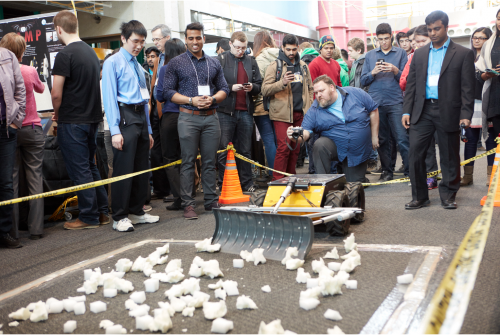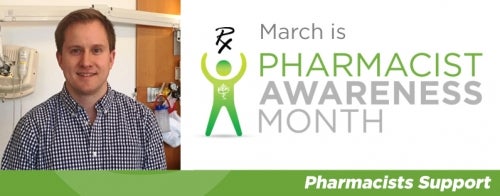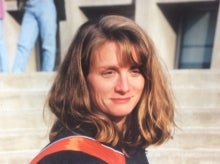The Daily Bulletin is published by Internal and Leadership Communications, part of University Communications
Contact us at bulletin@uwaterloo.ca
Submission guidelines
Editor:
Brandon Sweet
University Communications
bulletin@uwaterloo.ca

Collaborating on a research project abroad can be of tremendous benefit to a research program.
The German Academic Exchange Service (DAAD) invites Waterloo faculty members, postdocs, and PhD students to attend an information session on Germany’s vibrant research landscape, and to learn about helpful tools for identifying potentials collaborators, as well as funding open to Canadian scholars. The session, which takes place March 22 from 10 a.m. to 11 a.m. in the William G. Davis Computer Research Centre, (Room 1304), will be presented by John Paul Kleiner, Senior Manager, University Relations at the DAAD Information Centre in Toronto.
In 2015, Professor Kirsten Morris, Applied Mathematics, Faculty of Mathematics, received DAAD funds to visit Professor Birgit Jacob at the University Wuppertal in Germany to collaborate on control theory research. The funding enabled a month long visit and to make significant progress on a new research project. Prof. Morris was also able to make brief visits to colleagues at nearby universities.
For researchers interested in DAAD, she suggests that applicants think about how their research is beneficial to German research and universities, since the purpose is to promote and advance German research and academics.

Engineering projects that push the boundaries of innovation will be on display at the annual Capstone Design symposia that begin this week.
Senior-year engineering students at Waterloo will exhibit projects ranging from snow-removal machines that use ultrasound technology to decaffeinating coffee filters for household coffee machines.
"The design projects represent months of hard work by our inventive students," said Rick Culham, acting dean of engineering. "As in past years, we anticipate that some of the projects will lead to successful start-up companies and the commercialization of new products and services.”
Capstone Design is a degree requirement for undergraduate engineering students at Waterloo. During the symposia from March 17 through 28, at least 700 students in 12 programs will present more than 150 projects.
On March 29, 15 qualifying teams will compete for $60,000 in a pitch presentation funded by the Esch Foundation. The winner of the Sedra People's Choice Award will receive an additional $3,000 in funding.
Additional project highlights this year include:
Members of the public and the media are invited to the Capstone projects on display, which are located in the Great Hall of the Davis Centre, Engineering 5, and Engineering 6.
For symposium dates and times, visit the Capstone website.

The Pharmacists Support series is issued by the School of Pharmacy for #PAM2017. It runs every Tuesday and Thursday in March.
“Cancer is a scary diagnosis,” says alumnus Michael Collins. “Not only do oncology pharmacists require complex therapeutic knowledge, we also require the soft skills needed to empathize in such a difficult part of a cancer patient’s life.”
Michael, a graduate of School of Pharmacy’s first class, knew he wanted to work in a hospital before he’d even begun pharmacy school.
“I worked in a retail pharmacy as part of co-op in high school,” he explains. “I enjoyed the experience but felt a lack of clinical involvement; it felt too much like a business.”
Now, he specializes in oncology at Grand River Hospital, just up the street from the School. He works closely with cancer patients, and meets regularly with those starting or undergoing chemotherapy.
“It’s a privilege,” Michael says, “to be a part of the patient’s journey here at the cancer centre.”
 Staff in the Library are mourning their colleague Rachel Hull, who died March 11.
Staff in the Library are mourning their colleague Rachel Hull, who died March 11.
A Waterloo alumna, Hull graduated with a BES in Geography in 1997. As an undergraduate, she worked in the University Map Library. After her graduation she worked for several years in the non-profit sector, returning to the University where she worked in the Registrar's Office and later the Mathematics Undergraduate Office.
She rejoined the Library in March 2016 and worked as a Resource Sharing Supervisor.
“Rachel worked in the Library when she was an undergraduate student, and she was thrilled to come back here last year to work for us full-time,” says Samantha Gibbon, Manager, Resource Sharing & Reserves. “Her infectious smile and positive energy touched everyone, and she will be missed."
If you would like to contribute to a memorial tree on campus for Rachel, follow these instructions:
There is an option to make your gift anonymously.
Strategies to boost the number of women in science, technology, engineering and mathematics (STEM) programs will be the focus of a panel discussion in the Science Teaching Complex this afternoon.
Panelists at the event, part of the ongoing HeForShe Impact 10x10x10 initiative, will include:
Also on the agenda is discussion of the many challenges related to improving access to educational opportunities for girls and women in developing nations.
The panel discussion is organized by the University’s HeForShe engineering chapter and takes place from 2:45 p.m. to 4:00 p.m. in Room 0020 of the Science Teaching Complex.
The Waterloo Institute for Sustainable Energy (WISE) is hosting a guest seminar featuring Professor Josh Taylor from the Department of Electrical & Computer Engineering at the University of Toronto entitled "Leveraging Energy Storage and Demand Response in Power System Operations." The seminar takes place on Wednesday, March 22 at 10:30 a.m. in EIT 3142.
Here's today's Nutrition Month "myth vs. fact" supplied by Health Services Dietician Sandra Ace:
Myth: Drinking cranberry juice prevents a urinary tract infection (UTI).
Fact: An important step in the development of a UTI is bacteria sticking to the cells that line the urinary tract. Consuming cranberry products can help prevent that adhesion, however, research findings are inconsistent and taking cranberry products have not always been shown to prevent UTIs. A 2012 systematic review of 24 studies concluded that cranberry’s preventative role is less effective than previously found in a 2008 review, although some small studies demonstrated a limited benefit for women with recurrent UTIs. A recent study published in the Journal of the American Medical Association failed to find a benefit over a year period in elderly women given cranberry extract capsules equal to drinking 20 ounces of cranberry juice verses a placebo group.
What is also unclear is whether drinking cranberry juice or taking cranberry extract supplements is more beneficial or what the most effective dose of either alternative is. If you choose to take a cranberry drink to prevent a UTI, it is best to use 100% pure cranberry juice, which is costly and can be hard to find. Cranberry juice cocktail contains more water and sugar and may be a blend of other less expensive juices so it has a much smaller amount of proanthocyanidins, thought to be the active ingredient in cranberry products. If you are considering taking a cranberry extract supplement, check the label for a Natural Product Number (NPN) or a Drug Identification Number (DIN). This means the product is regulated and approved for sale in Canada. Speak to your health care provider before taking a supplement or if you think you have a UTI. Cranberry products are not effective for treating existing urinary tract infections.
Knowledge Integration eXhibition (KI-X 2017), Monday, March 13 to Saturday, March 18, St. Jerome's University, Siegfried Hall Residence Wellness Centre.
NEW - Drama and Speech Communication presents "Unconscious Curriculum: Rape Culture on Campus," Thursday, March 16 to Saturday, March 18, 8:00 p.m., Theatre of the Arts.
Mitacs: Foundations of Project Management 1 – Day 1 of 2, Thursday, March 16, 9:00 a.m., Centre for Career Action.
Successfully Negotiating Job Offers, Thursday, March 16, 1:30 p.m., Centre for Career Action.
Water Institute lecture featuring Diane Dupont, “Floods and Droughts: Eliciting Customer Willingness-to-Pay and Adverse Event Likelihood,” Thursday, March 16, 2:30 p.m., QNC 1501.
CBB Biomedical Discussion Group, “Technology and Older Adults: Assisting Activities in the Home. Overview of intelligent systems to support aging-in-place.” Thursday, March 16, 2:30 p.m., STC 1019.
Water Institute and Department of Economics public lecture featuring Diane Dupont, Brock University, “Floods and Droughts: Eliciting Customer Willingness-to-Pay and Adverse Event Likelihood Priors for Public Utility Pricing and Infrastructure Decisions,” Thursday, March 16, 2:30 p.m., QNC 1501.
Law School Administrations, Thursday, March 16, 5:30 p.m., Centre for Career Action.
Arriscraft Lecture Series featuring Duane Linklater, "Artist Talk, "Thursday, March 16, 6:00 p.m., Cummings Lecture Theatre, School of Architecture.
Velocity Fund $5K Qualifiers – Night 2, Thursday, March 16, 7:00 p.m., Quantum-Nano Centre Room 0101.
Beyond 60 Public Lecture, "Post-truth. Fake news. Alternative facts". Thursday, March 16, 7:00 p.m., Kitchener Public Library Main Branch.
Mitacs: Foundations of Project Management 1 – Day 2 of 2, Friday, March 17, 9:00 a.m., Centre for Career Action.
Résumé Tips: Thinking Like an Employer, Friday, March 17, 10:30 a.m., Centre for Career Action.
Knowledge Integration seminar: “Simple and Consistent”, featuring Ben Fanelli, EMPWR Foundation Director, former Captain OHL Kitchener Rangers, Friday, March 17, 2:30 p.m., EV3-1408.
March Break Open House, Saturday, March 18.
Management Consulting as a Career Option, Monday, March 20, 2:30 p.m., TC - William M. Tatham Centre room 2218.
Electrical and Computer Engineering Capstone Design Symposium, Tuesday, March 21, 9:30 a.m. to 4:00 p.m., DC atrium.
World Water Day, Wednesday, March 22, Wilfrid Laurier University Lazaridis Hall.
Research Opportunities with Germany, Wednesday, March 22, 10:00 a.m. to 11:00 a.m., William G. Davis Computer Research Centre (DC 1304). Please register.
NEW - Translating Academic Experience to Industry for PhDs/Postdocs, Wednesday, March 22, 10:00 a.m., TC - William M. Tatham Centre room 1208.
NEW - Exploring Your Personality Type – Myers-Briggs Type Indicator Part 2, Wednesday, March 22, 10:30 a.m., TC - William M. Tatham Centre room 1112.
NEW - WISE seminar featuring Professor Josh Taylor, Department of Electrical & Computer Engineering, University of Toronto, "Leveraging Energy Storage and Demand Response in Power System Operations," Wednesday, March 22, 10:30 a.m., EIT 3142.
Paving the way for excellent dementia care and support: A three-part education initiative: “Enhancing communication in dementia care,” Wednesday, March 22, 11:30 a.m., DC 1302.
NEW - How to be an Exceptional Employee, Wednesday, March 22, 2:30 p.m., TC - William M. Tatham Centre room 1208
Velocity Start: The Startup Rollercoaster, Wednesday, March 22, 7:30 p.m., Velocity Start, SCH 2nd Floor.
Hagey Lecture: “Memory and the Aging Brain,” featuring Carol Barnes, Wednesday, March 22, 8:00 p.m., Humanities Theatre.
School of Computer Science Distinguished Lecture Series featuring Daniel Alan Spielman, “The Laplacian Matrices of Graphs: Algorithms and Applications,” Thursday, March 23, 3:30 p.m., DC 1302.
Three-Minute Thesis (3MT) finals, Thursday, March 23, 3:00 p.m., Theatre of the Arts.
Gendered Violence on Campus: Institutional Policy and Practice, Thursday, March 23, 3:30 p.m., QNC 0101.
UUfie - Recent Projects, Thursday, March 23, 6:00 p.m., Cummings Lecture Theatre, School of Architecture.
Colourful X-rays featuring Electrical and Computer Engineering Professor Karim S. Karim, Friday, March 24, 12:00 p.m. to 1:00 p.m. Please register. Seating is limited.
Further Education Boot Camp, Saturday, March 25, 10:00 a.m., TC 2218.
Canadian Interdisciplinary Vision Rehabilitation Conference, Saturday, March 25 and Sunday, March 26, School of Optometry and Vision Science.
Implementing the Sustainable Development Goals: Identifying Critical Steps for Canadian Impact, featuring Dr. Jeffrey Sachs and his wife Dr. Sonia Elrich Sachs, Tuesday, March 28, 11:00 a.m., Federation Hall.
TD Walter Bean Lecture in Environment featuring Jeffrey Sachs, "Rising Nationalism versus Global Cooperation for Sustainable Development," Tuesday, March 28, 5:00 p.m., Humanities Theatre.
CBB Workshop: UWaterloo Intellectual Property Part 4 -Trademarks, Trade Secrets, Industrial Designs, Wednesday, March 29, 10:30 a.m., QNC 1501.
Beyond 60 Lecture: From Connected to Autonomous, Wednesday, March 29, 6:00 p.m., University of Waterloo Stratford Campus.
Conflicts and agreements: Canada’s foundations and their consequences, Friday March 31, 7:00 p.m. to 9:00 p.m., STC 0010. Refreshments and displays at 6:15 p.m.
Chemical Engineering. Kamal Al Rafea, "Utilizing 'Power-to-Gas' Technology for Storing Energy and to Optimize the Synergy between Environmental Obligations and Economical Requirements." Supervisor, Ali Elkamel. On deposit in the Engineering graduate office, DWE 3520C. Oral defence Wednesday, March 29, 1:00 p.m., E6 2022.
Management Sciences. Arash Dahaj, "Essays on International Venture Capital." Supervisor, Brian Cozzarin. This thesis is restricted but on display in the Engineering graduate office, DWE 3520C. Oral defence Wednesday, March 29, 1:00 p.m., CPH 4333.
School of Public Health and Health Systems. Heather McNeil, "Engaging Canada's Older Adults in Health TECHnology Innovation Ecosystems: The ECOTECH Project." Supervisor, Paul Stolee. On display in the Faculty of Applied Health Sciences, BMH 3110. Oral defence Thursday, March 30, 10:00 a.m., BMH 3119.
Chemical Engineering. Falah Alhameli, "Multiscale Modeling in Mathematical Programming: Application of Clustering." Supervisor, Eli Elkamel. This thesis is restricted but on display in the Engineering graduate office, DWE 3520C. Oral defence Thursday, March 30, 10:00 a.m., E6 2022.
The Daily Bulletin is published by Internal and Leadership Communications, part of University Communications
Contact us at bulletin@uwaterloo.ca
Submission guidelines
The University of Waterloo acknowledges that much of our work takes place on the traditional territory of the Neutral, Anishinaabeg, and Haudenosaunee peoples. Our main campus is situated on the Haldimand Tract, the land granted to the Six Nations that includes six miles on each side of the Grand River. Our active work toward reconciliation takes place across our campuses through research, learning, teaching, and community building, and is co-ordinated within the Office of Indigenous Relations.